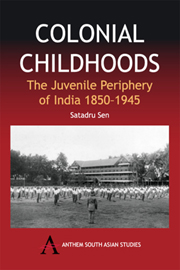Book contents
- Frontmatter
- Contents
- Dedication
- Acknowledgements
- Introduction
- 1 State of the Experiment: Experts, Parents and the Reformatory
- 2 The Nature of the Beast: The Content of Institutionalized Childhood
- 3 Experimental Childhoods: Pain and the Reformatory
- 4 Gendering the Reformatory
- 5 Masters and Servants: School, Home and Aristocratic Childhood
- 6 The Politics of Deracination
- Conclusion
- Notes
- Bibliography
- Index
1 - State of the Experiment: Experts, Parents and the Reformatory
Published online by Cambridge University Press: 05 March 2012
- Frontmatter
- Contents
- Dedication
- Acknowledgements
- Introduction
- 1 State of the Experiment: Experts, Parents and the Reformatory
- 2 The Nature of the Beast: The Content of Institutionalized Childhood
- 3 Experimental Childhoods: Pain and the Reformatory
- 4 Gendering the Reformatory
- 5 Masters and Servants: School, Home and Aristocratic Childhood
- 6 The Politics of Deracination
- Conclusion
- Notes
- Bibliography
- Index
Summary
At present it must only be regarded as an experiment, though an experiment with a very fair chance of success, and one in which a little success will counterbalance many failures.
Bengal committee on reformatory schools, 1874Expertise and experiments, rather than reformed children, were the prized products of the colonial reformatory. Not long after the initiation of the reformatory project in India, a curious assortment of career jailors, modernizing bureaucrats, native authority figures, women social workers, capitalists and religious colonizers had gathered under the umbrella of juvenile reform. As a group, they were similar to the ‘voluntary empire’ that Patricia Barton has identified in early twentieth-century entrepreneurial oversight, but not identical or coterminous, being much more closely affiliated with the state. Simultaneously, the increasing significance and authority of the ‘professional’ had expanded and complicated the qualifications that were required of the supervisors of institutionalized children. Under the circumstances, expertise and authority were not stable in their disciplinary, racial, geographical and gendered locations. They were contested continuously between ‘qualified’ professional and ‘unqualified’ worker, expert and expert, scientist and bureaucrat, birth parent and surrogate parent, European and native, metropolitan specialist and colonial improviser, institutional patriarch and female interloper.
This instability increased in the closing years of the nineteenth century as middle-class Indians became more assertive in the reformatory, because these men (and eventually women) brought with them their peculiar political imperatives.
- Type
- Chapter
- Information
- Colonial ChildhoodsThe Juvenile Periphery of India 1850–1945, pp. 9 - 50Publisher: Anthem PressPrint publication year: 2005



